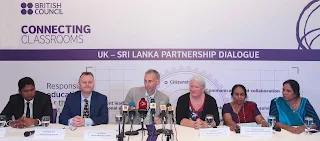 |
| (From Left) Sajeewa Meepage - Manager Schools Programme, David Maynard - Deputy Country Director, Lucas Bak - Branch Manager Kandy, Karen Fulton - Head Teacher - St. Joseph's |
‘Responsible Education for the 21st Century.’
The British Council in Sri Lanka hosted media and guests at an event to celebrate UK-Sri Lanka Partnership Dialogue under the theme of ‘Responsible Education for the 21st Century.’ The event was held at the Mahaweli Reach Hotel in Kandy on Thursday 16 February.
This initiative is linked to British Council’s Schools Programme, which aims to connect the UK and Sri Lankan school sectors to enrich education, promote global citizenship and build international trust and understanding. The programme helps teachers bring awareness and understanding of global issues to young people by linking ‘classrooms’ and schools, between the UK, Sri Lanka and other overseas countries.
Since 2012 the programme has supported over 300 links, delivered courses and online training to over 1000 Sri Lankan teachers and enhanced the leadership skills of 150+ other head teachers across Sri Lanka.
 |
| (From Left)David Maynard - Deputy Country Director, Lucas Bak - Branch Manager Kandy, Karen Fulton - Head Teacher - St. Joseph's Academy |
The focus of the 21st century skills training is embedding 21st century learning skills into local classroom practices. This was initiated in June 2015. The training offered professional development opportunities for Sri Lankan teachers and head teachers on six 21st century skills through class room based educational action research. These skills are; student leadership and personal development, citizenship, communication and collaboration, critical thinking and problem solving, creativity and imagination, and digital literacy.
After completing classroom action research, teachers were eligible to apply for professional partnership and with a partner school in the UK. Over an 18 month period the British Council has trained 800 teachers and 250 head teachers via this course. The Central Province in particular was a keen partner, with 5 out of 11 successful partnerships. 190 teachers and head teachers received the above training from the central province.
Commenting on the initiative, British Council Country Director Keith Davies said, “We strongly believe that there is no substitute for a determined and accomplished teacher in the classroom. At a time when everything can be found on the internet, equipping our teachers with the right skills to communicate with the 21st-century student is vital. Our training has produced a strong cohort of teachers to take charge of the classroom with new learnings and vision.”
11 UK schools and 22 delegates participated in the event alongside their local counterparts, along with a group of selected head teachers, trainers and British Council School Ambassadors, from the Central Province who had successfully completed the training programme.
About the British Council:
The British Council is the UK’s international organisation for cultural relations and educational opportunities. We create friendly knowledge and understanding between the people of the UK and other countries. Using the UK’s cultural resources we make a positive contribution to the countries we work with – changing lives by creating opportunities, building connections and engendering trust.
We work with over 100 countries across the world in the fields of arts and culture, English language, education and civil society. Each year we reach over 20 million people face-to-face and more than 500 million people online, via broadcasts and publications.
Founded in 1934, we are a UK charity governed by Royal Charter and a UK public body. The majority of our income is raised delivering a range of projects and contracts in English teaching and examinations, education and development contracts and from partnerships with public and private organisations. Eighteen per cent of our funding is received from the UK government.
Tags
Sri Lanka Business
